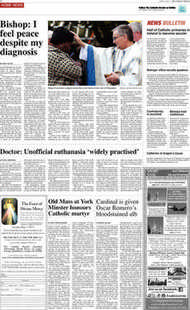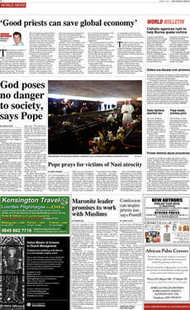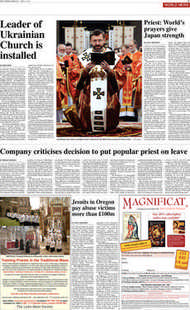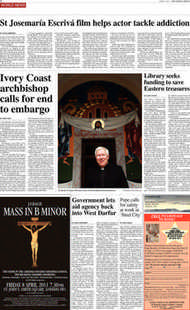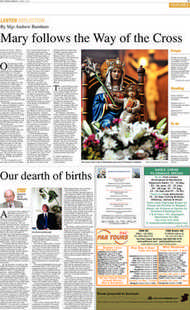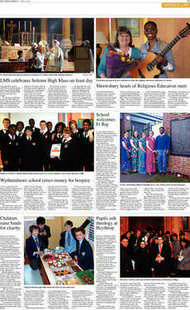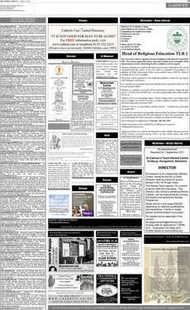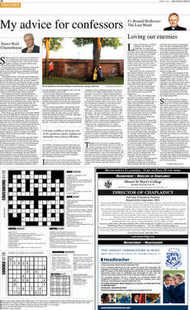Page 1, 1st April 2011
Page 1

Report an error
Noticed an error on this page?If you've noticed an error in this article please click here to report it.
Tags
Share
Related articles
Tripoli Bishop Calls For Ceasefire
Vatican Woos Gaddafi
Vatican Hails End Of Gaddafi Regime
The Church Can Help To Resolve The Libyan Conflict
Us Raid On Libyagrossly Irresponsible'
Church seeks end to Libya conflict
BY ED WEST
THE CATHOLIC CHURCH wants “peaceful and lasting solutions” to the war in Libya, the Apostolic Nuncio to Great Britain has said before a meeting of foreign ministers in London.
Archbishop Antonio Mennini was attending a meeting of ministers from 40 nations in London on Tuesday to discuss events in Libya, where Nato nations are carrying out a UN resolution aimed at protecting Libyan civilians from Muammar Gaddafi’s regime.
Prime Minister David Cameron met US Secretary of State Hillary Clinton as well as Libyan opposition leader Mahmoud Jibril before attending a private meeting with dozens of officials at Lancaster House.
Before the event, where the Holy See was acting as an observer, the archbishop told Vatican Radio that he hoped the international community would find a way to enforce a ceasefire that would allow for effective humanitarian care to be given to those in need.
He said: “There first of all should be a ceasefire in order to bring a concrete and effective peace to all sides. People in Libya are suffering, not just because of the current situation but previous sufferings too.” He also said there needed to be a “road map to facilitate the preparation and create conditions for a concrete and effective peace for all people in Libya, apart from their political, religious or ethnic identity”.
Nato took over command of military operations to help antiGaddafi rebels in eastern Libya last week, as part of an operation led by Britain and France.
In his Angelus address in St Peter’s Square on Sunday, the Pope said he was increasingly concerned at the news from Libya. He said: “My fear for the safety and well-being of the civilian population is growing, as is my apprehension over how the situation is developing with the use of arms.” He urged that dialogue, not mili tary force, be used in order to reach a peaceful solution, and appealed to Nato and its member countries to bring about the end of fighting.
He said: “To international agencies and to those with political and military responsibility, I make a heartfelt appeal for the immediate start of a dialogue that will suspend the use of arms.” Pope Benedict said that in times of international tension there was more urgency for diplomatic efforts that take advantage of “even the weakest sign of openness to reconciliation” among the parties in conflict. Solutions should be “peaceful and lasting”, he said. The Pope also prayed for “the return of harmony in Libya” and throughout North Africa, and expressed concern for the entire Middle East.
In Syria security forces killed at least 100 people after protests last week, while Yemen is on the brink of civil war following defections by senior military figures to the side of protesters.
Tensions in the Holy Land have sharply escalated following a week in which Hamas and Israel exchanged rocket fire. Last Wednesday a bomb exploded in Jerusalem, killing a British tourist.
“My thoughts go to the authorities and citizens of the Middle East,” the Pope said. “There, too, the path of dialogue and reconciliation should be chosen for a just and brotherly co-existence.” L’Osservatore Romano, the Vatican newspaper, has criticised what it described as “great confusion” about the aims of the Libyan operation. The United Nations resolution 1973 was designed to create a no-fly zone but allows member nations to use “all necessary measures” to protect Libyan civilians, which has enabled coalition forces to attack Libyan government forces. The Vatican newspaper said France had undertaken the military operation “in haste and without any co-ordination” with other key members of the international community.
As The Catholic Herald went to press Libyan rebel forces, many of them driving their own cars into battle, were poised to attack Colonel Gaddafi’s home town of Sirte, 250 miles from Tripoli, in what one commentator described as “Gaddafi’s Stalingrad”.
The bishops of North Africa have also called for an end to violence. The Episcopal Conference of the North African Region (CERNA), which includes bishops from Morocco, Algeria, Tunisia and Libya, released an “urgent appeal to find an end to this painful conflict, just and dignified for all”.
blog comments powered by Disqus



